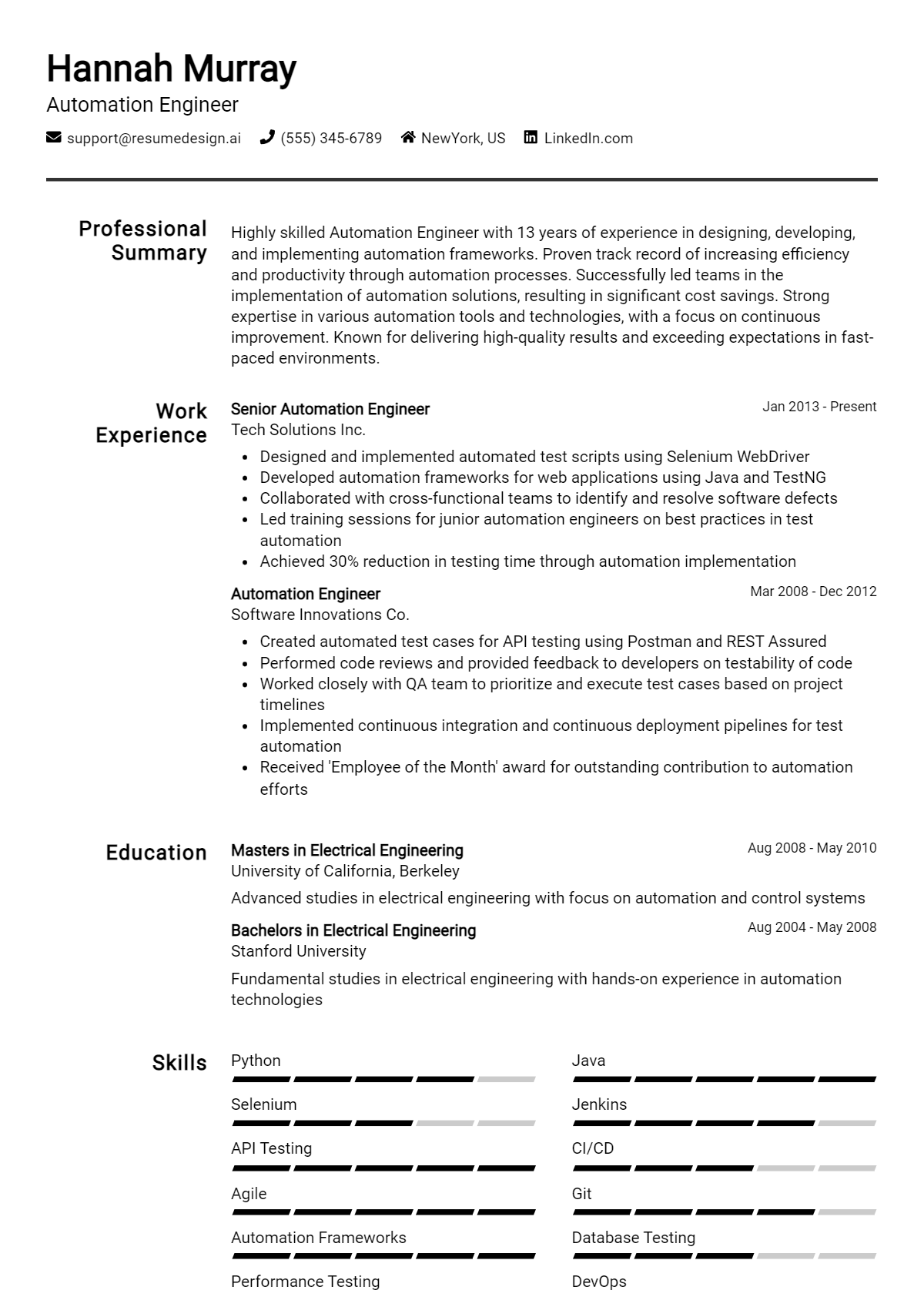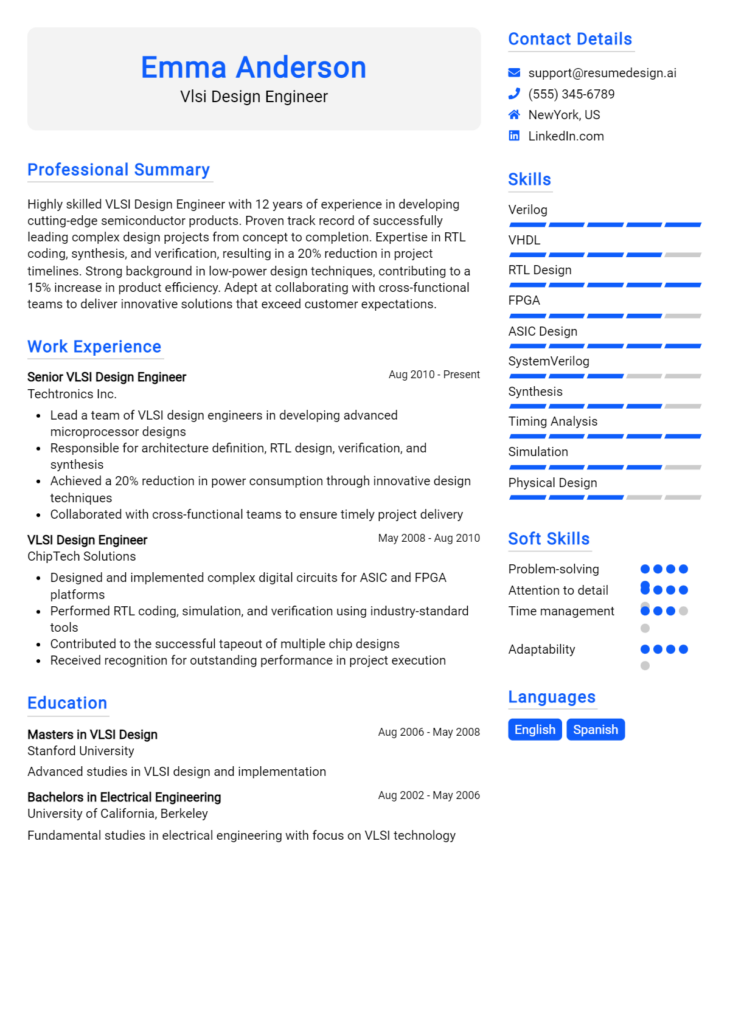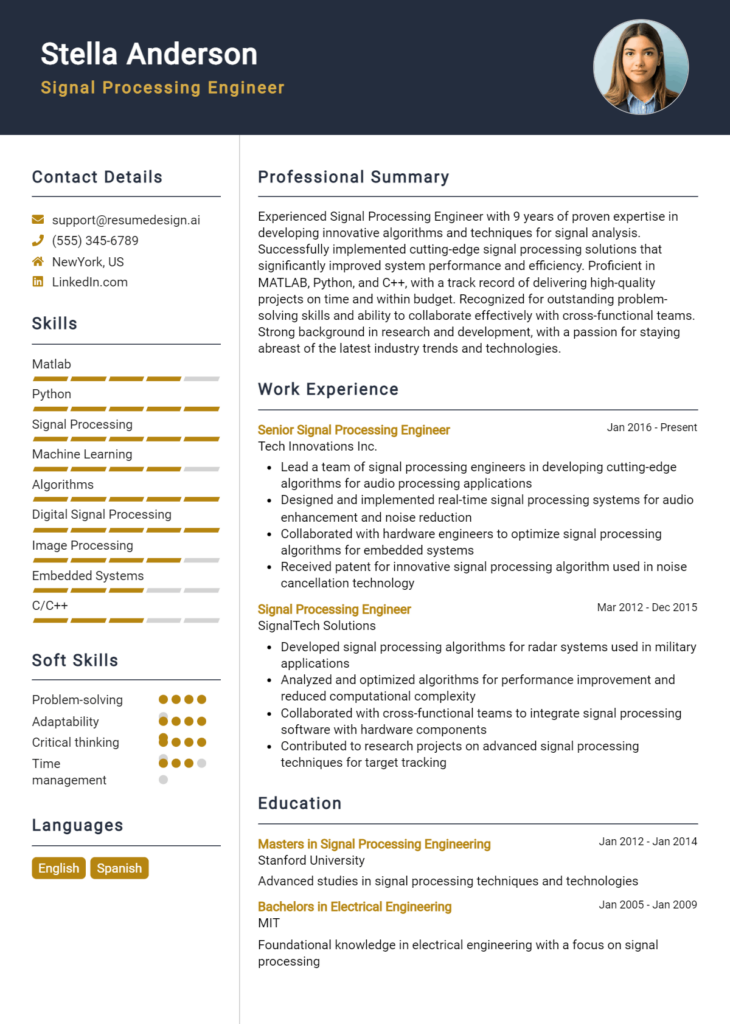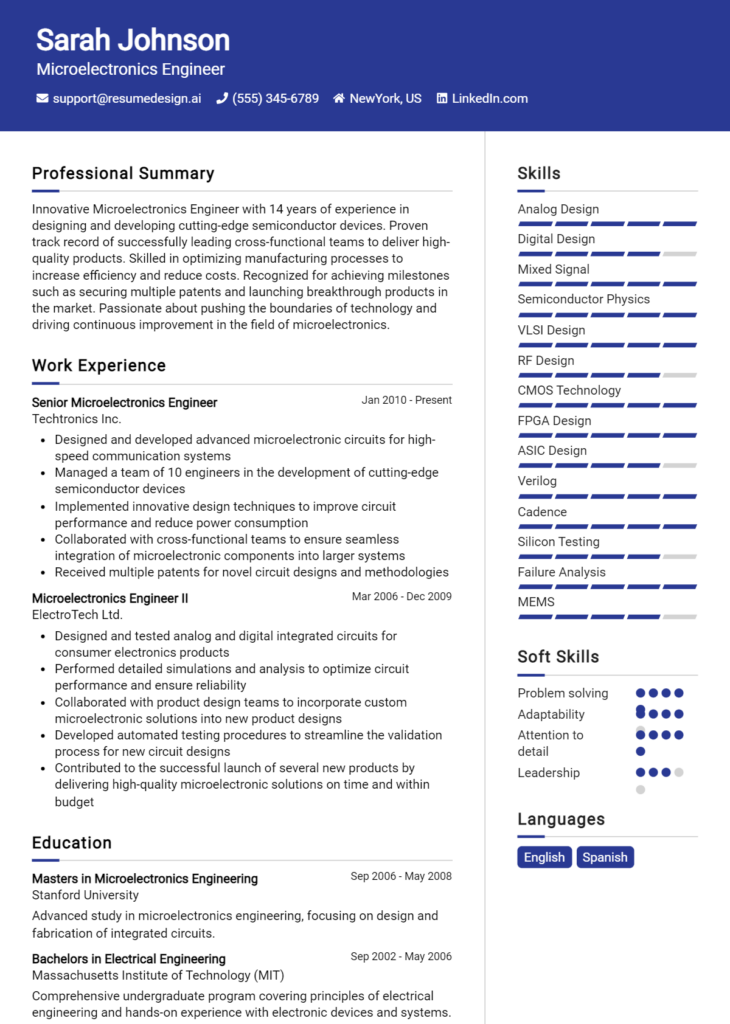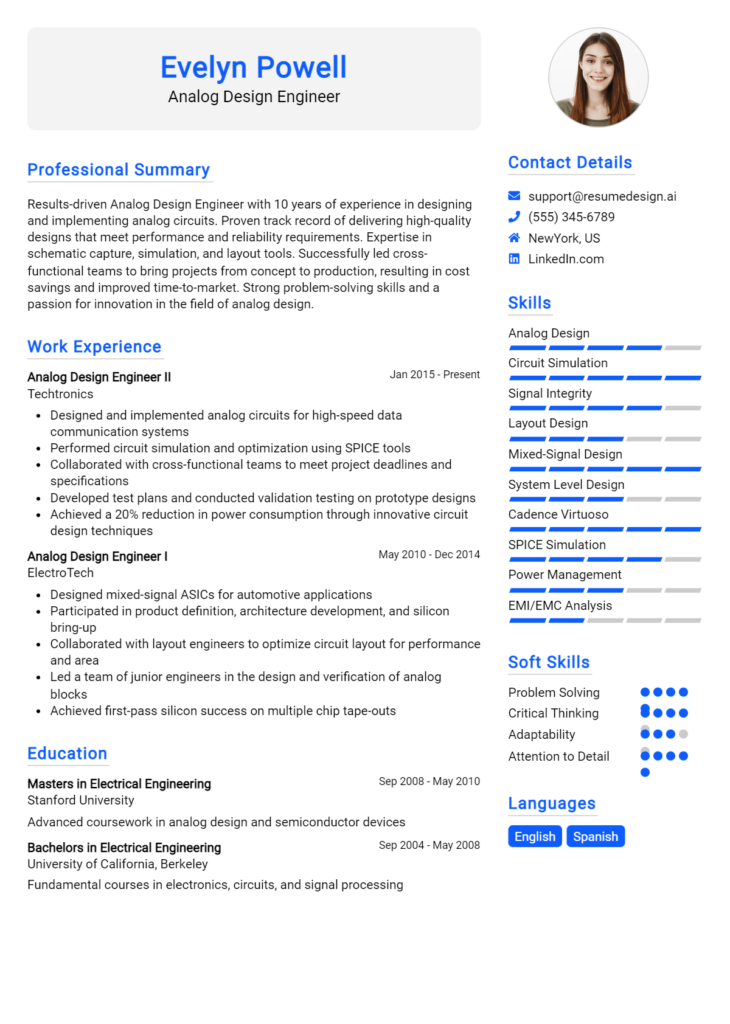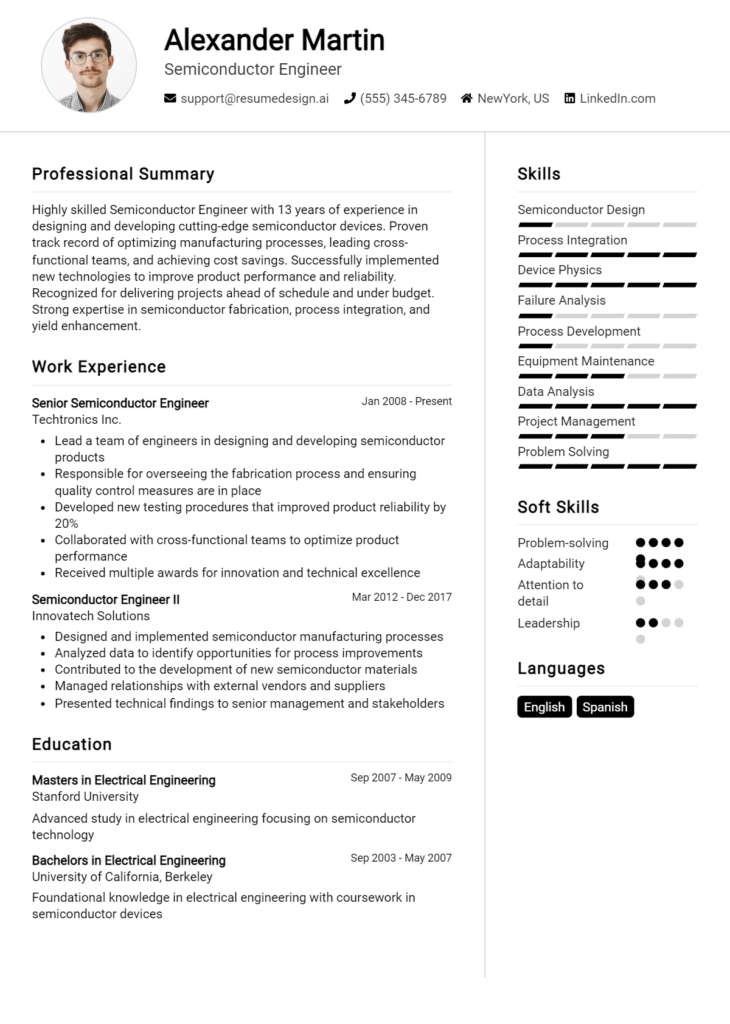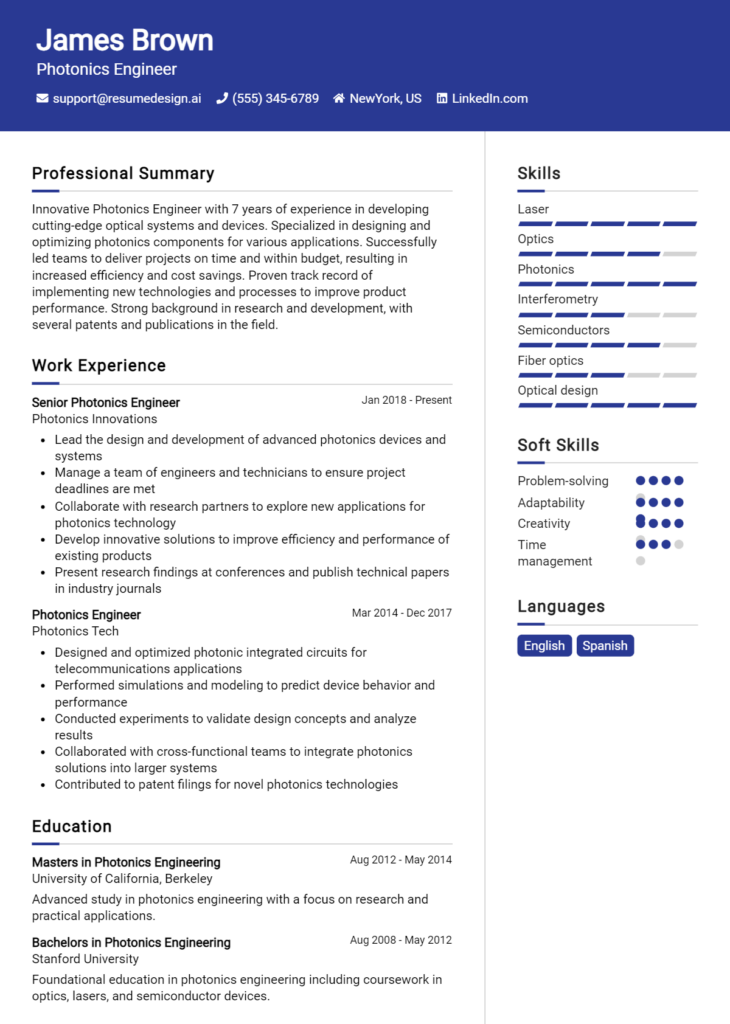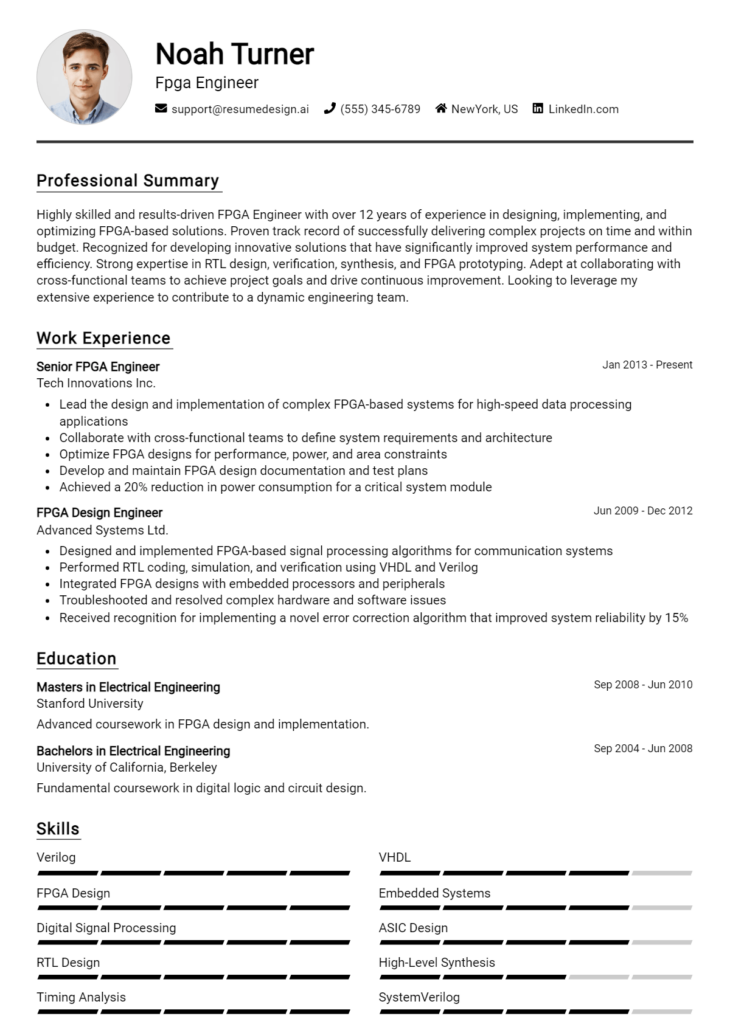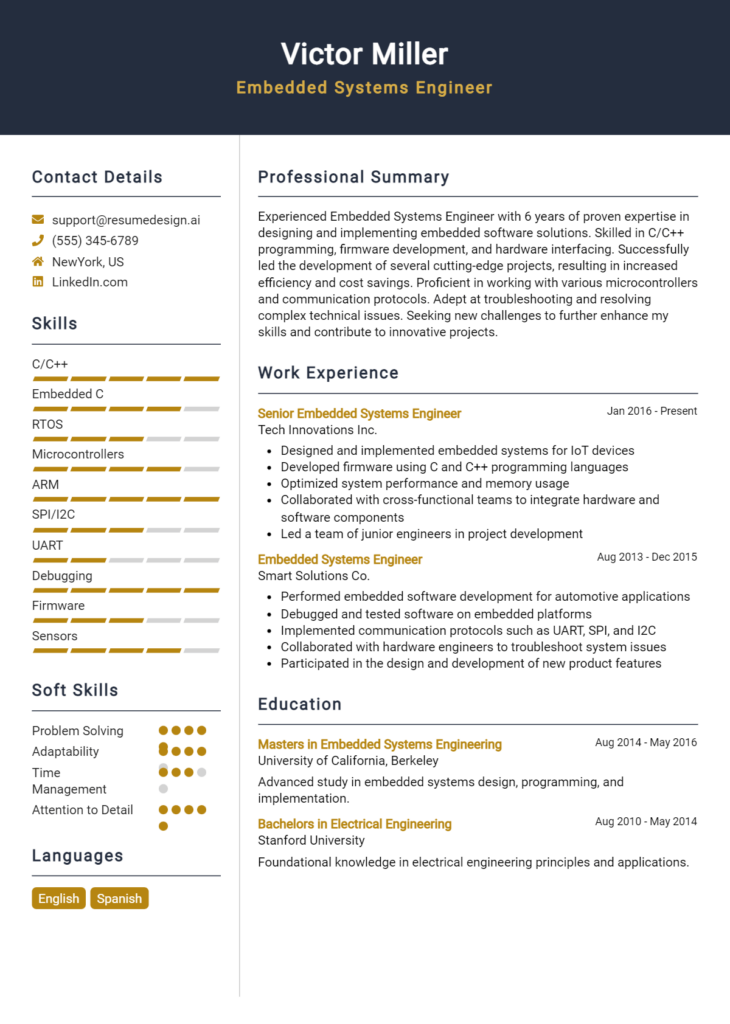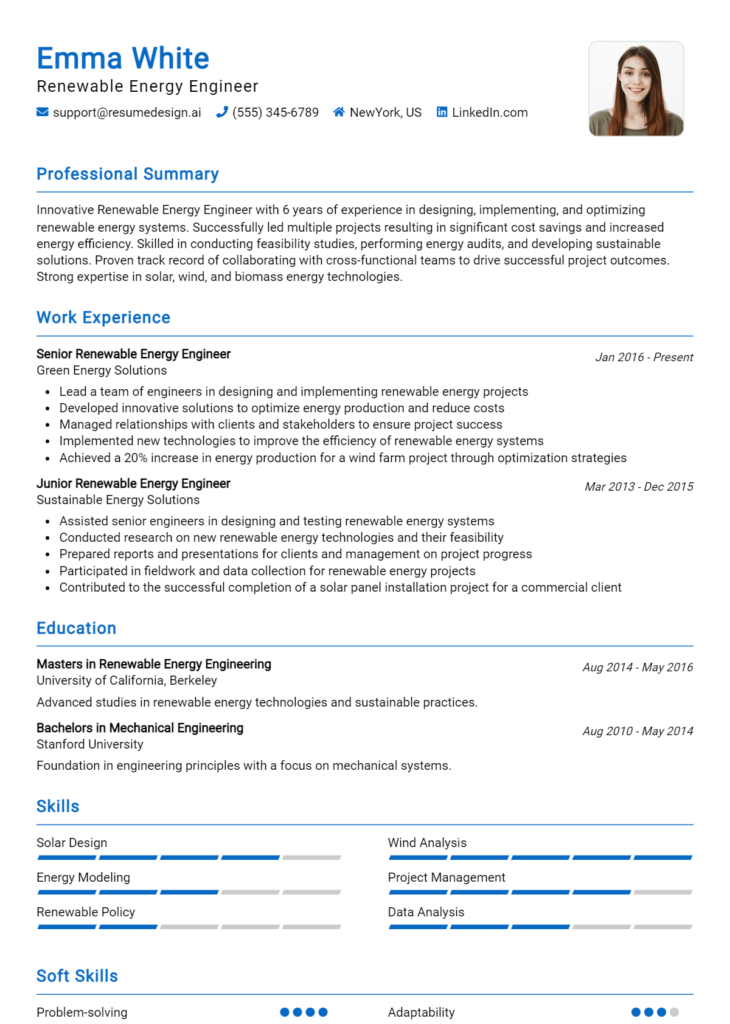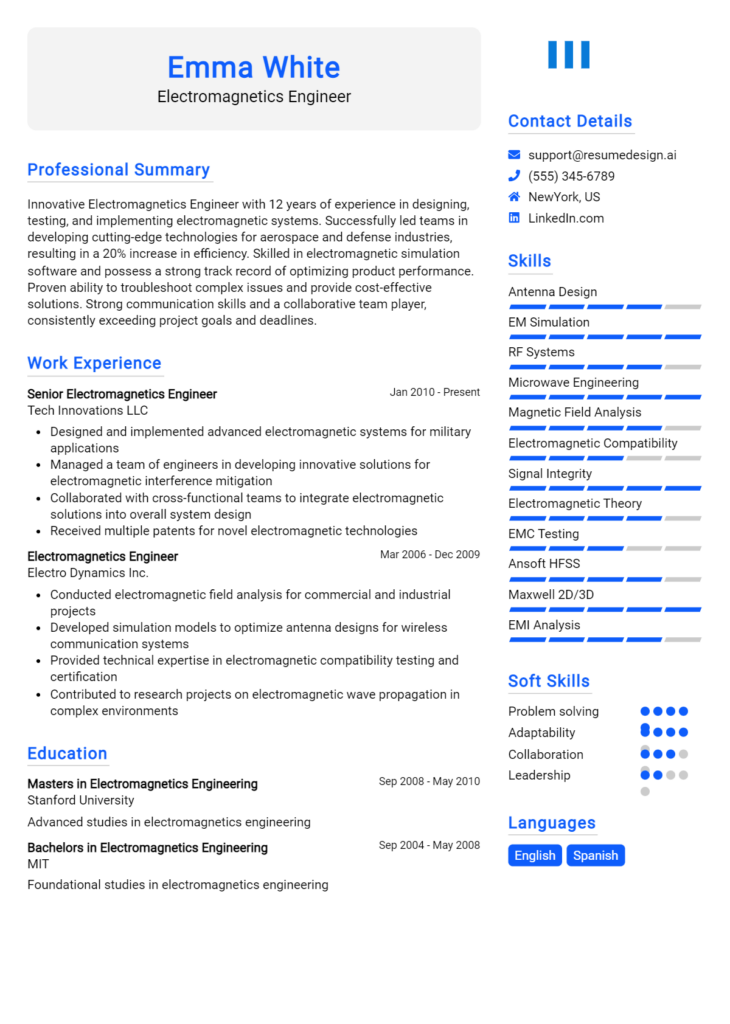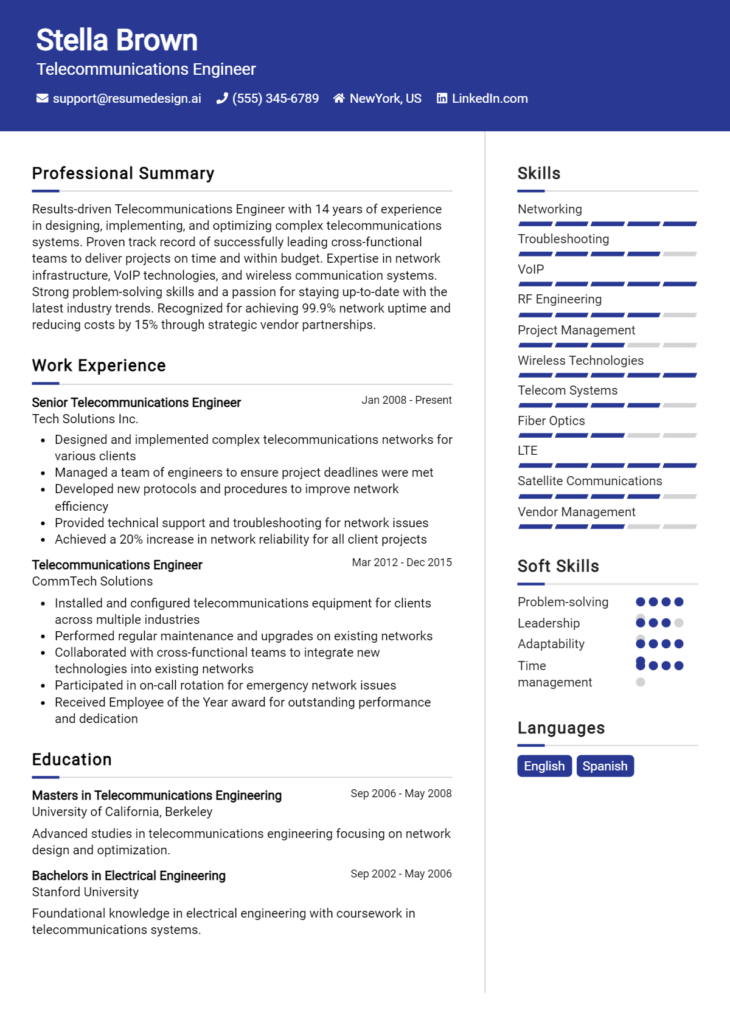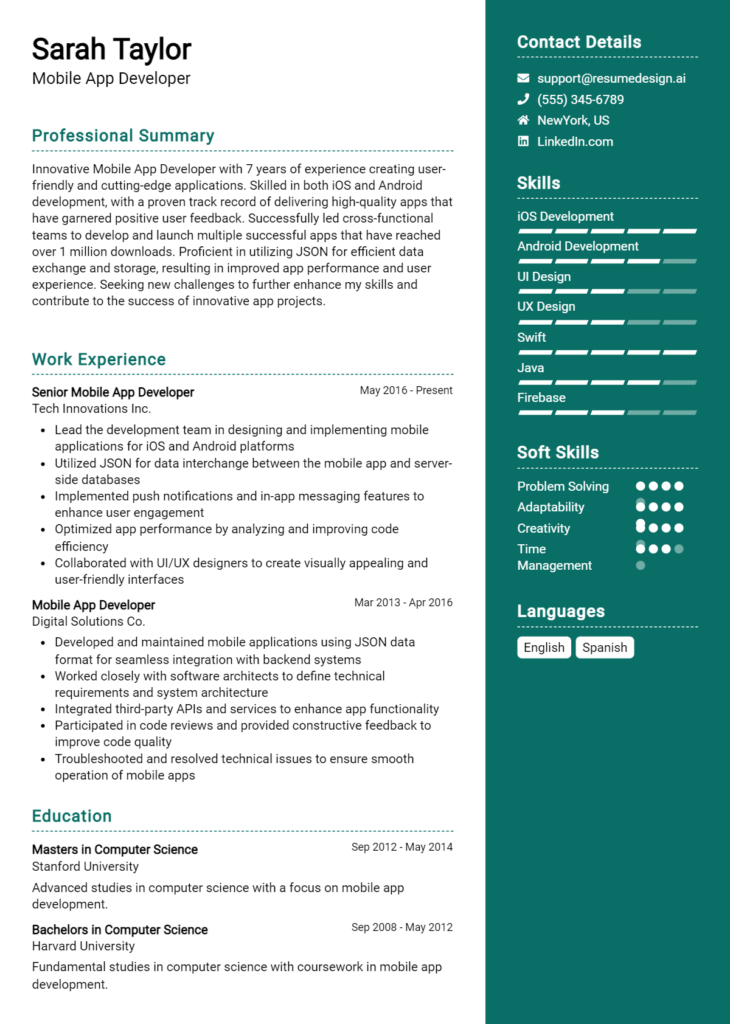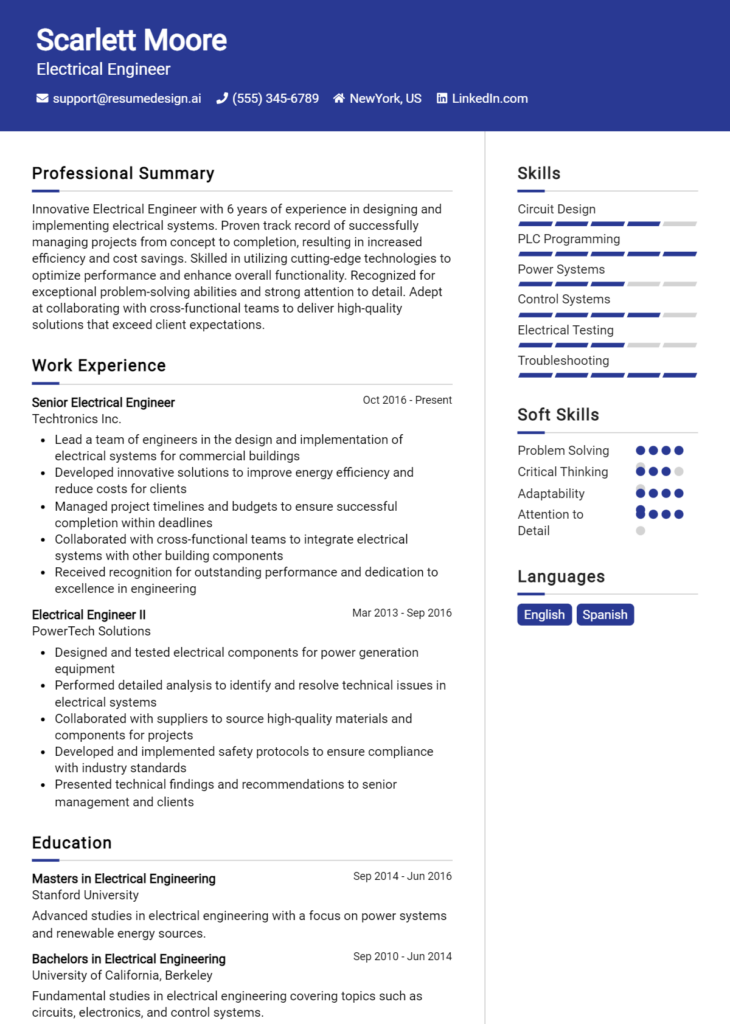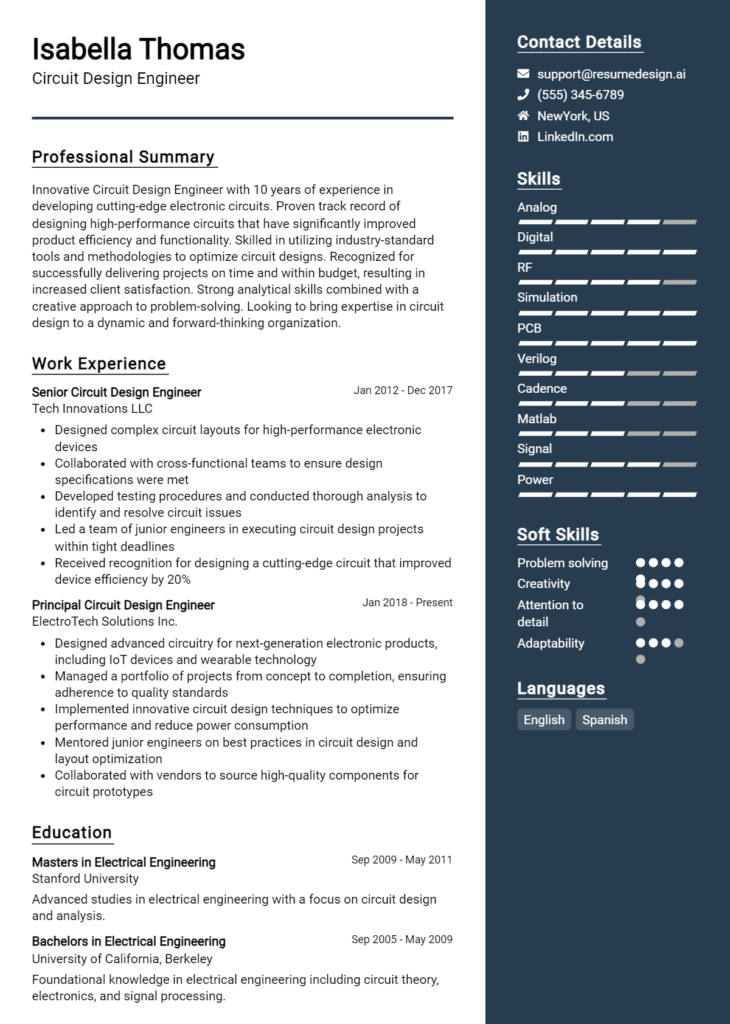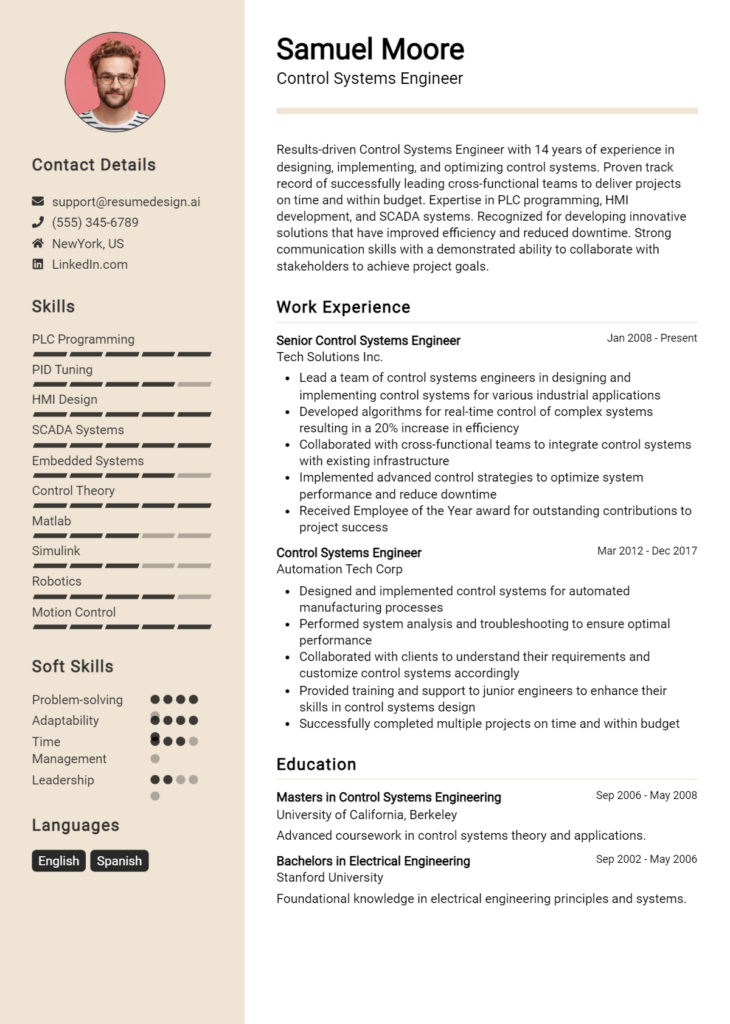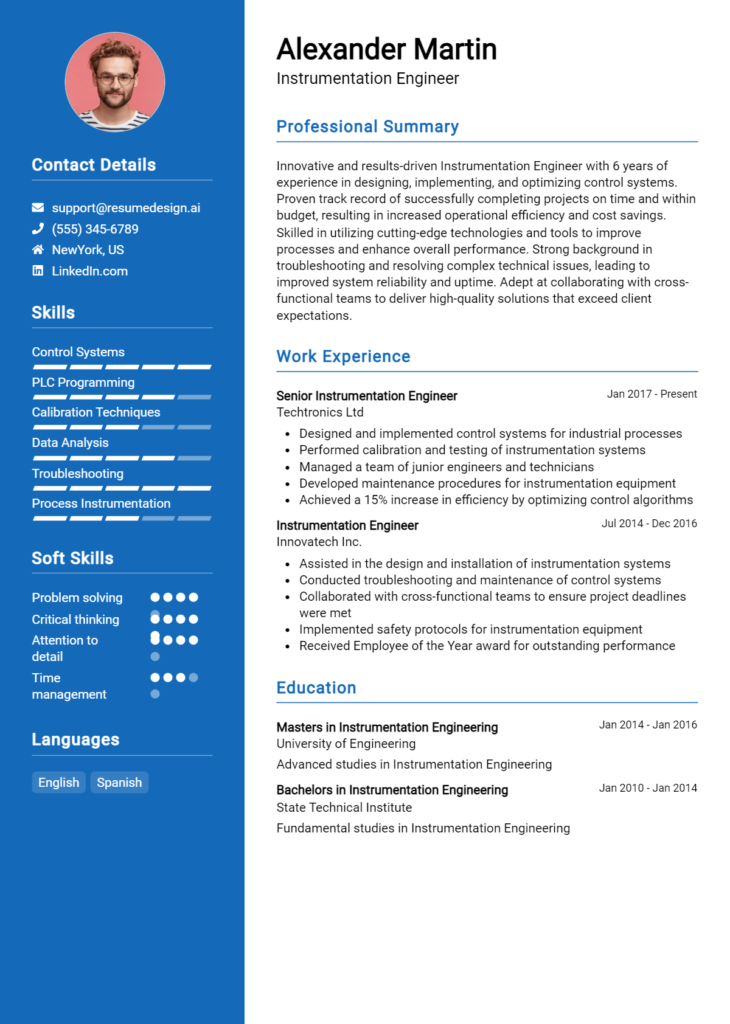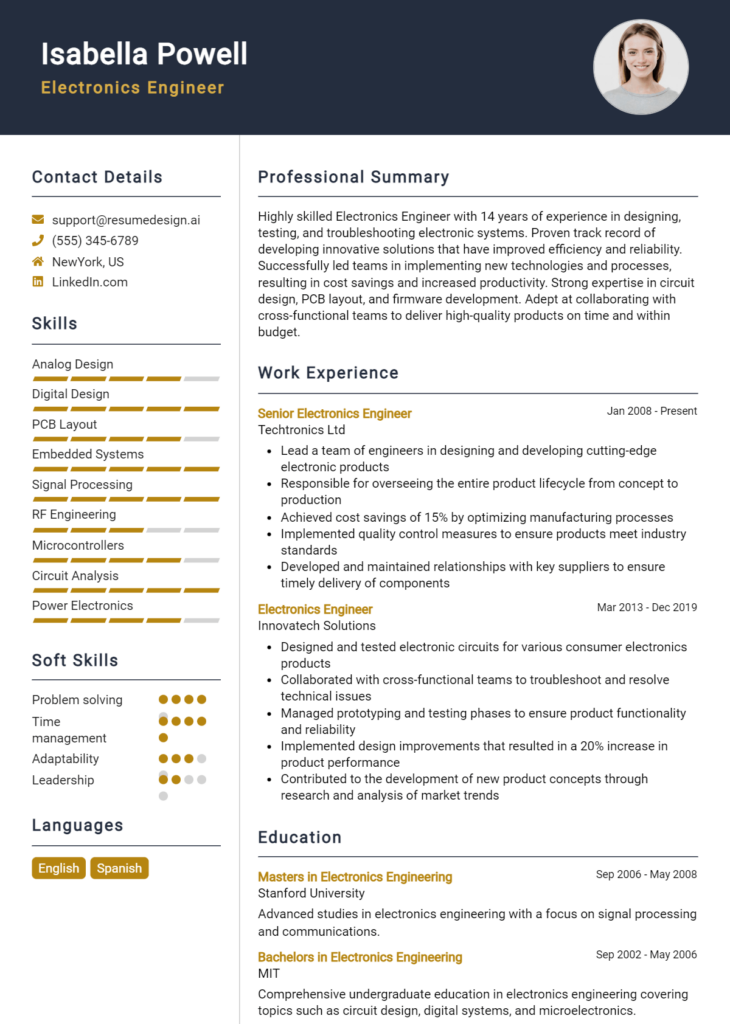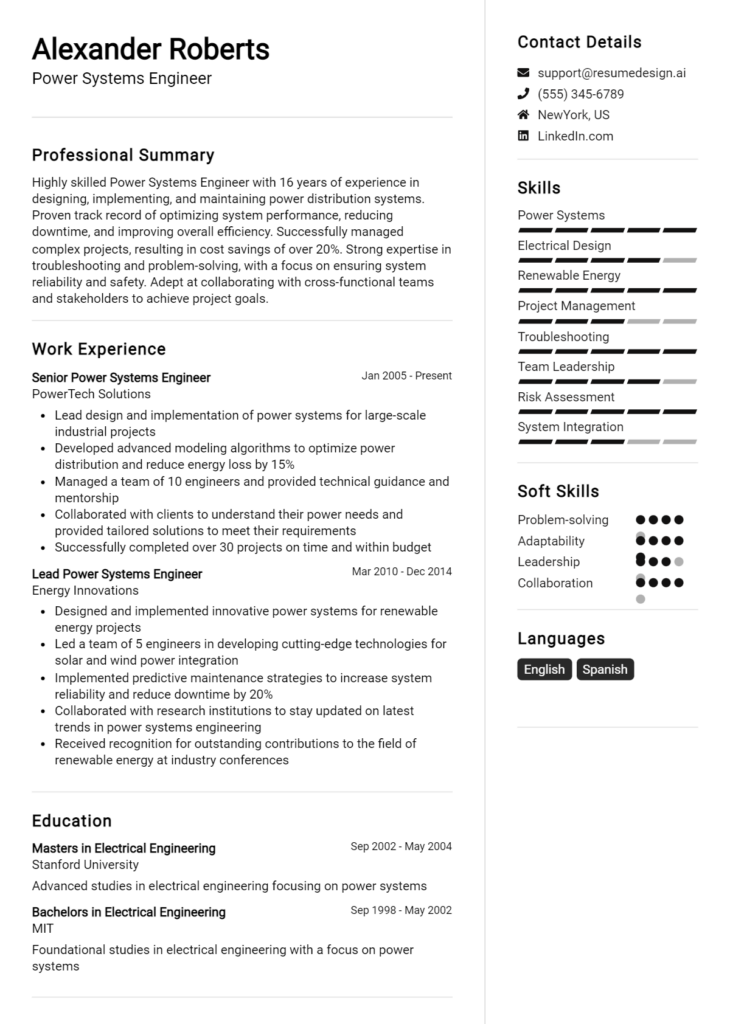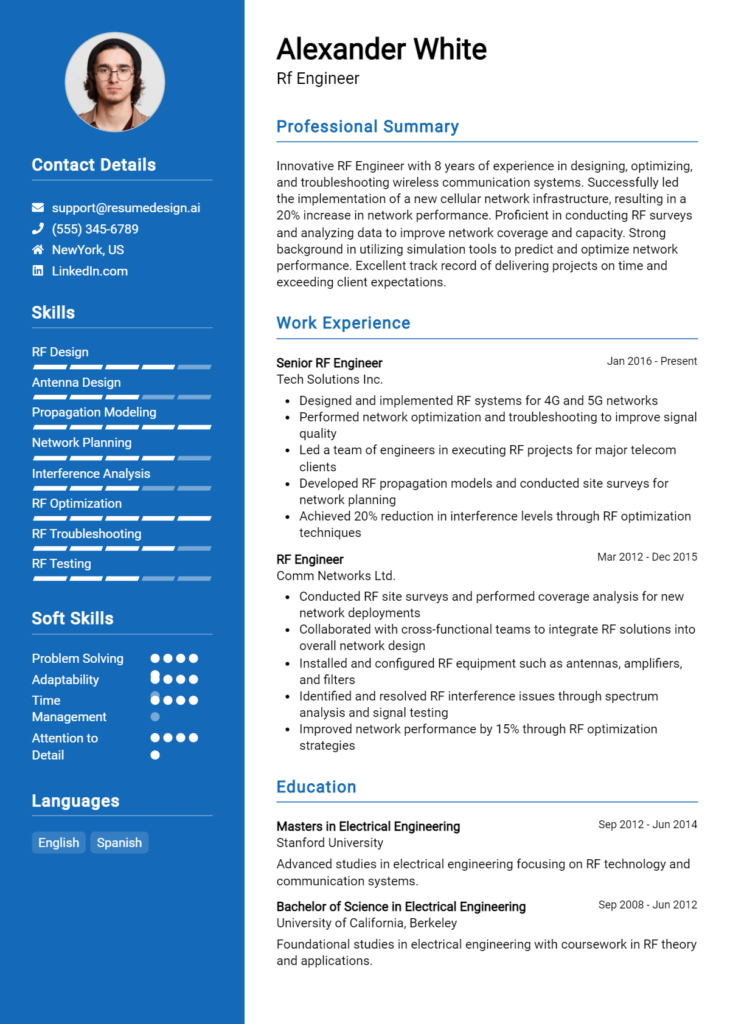Automation Engineer Core Responsibilities
An Automation Engineer plays a crucial role in enhancing operational efficiency by designing, implementing, and maintaining automated systems. This position requires a blend of technical skills, such as programming and systems analysis, alongside strong problem-solving capabilities and an understanding of various departmental workflows. By bridging gaps between functions, Automation Engineers help streamline processes, ultimately aligning with the organization's strategic goals. A well-structured resume can effectively showcase these technical and operational proficiencies, making a strong case for their value in any organization.
Common Responsibilities Listed on Automation Engineer Resume
- Design and develop automation systems and solutions.
- Collaborate with cross-functional teams to identify automation opportunities.
- Conduct testing and validation of automated processes.
- Monitor and analyze system performance metrics.
- Troubleshoot and resolve automation-related issues.
- Document automation processes and workflows.
- Implement continuous improvement initiatives.
- Stay updated with the latest automation technologies and trends.
- Provide training and support to staff on automated systems.
- Ensure compliance with industry standards and regulations.
High-Level Resume Tips for Automation Engineer Professionals
In the competitive field of automation engineering, a well-crafted resume is essential for standing out among a sea of applicants. Your resume often serves as the first impression you make on a potential employer, and it must effectively convey not only your technical skills but also your achievements in the field. As automation technologies continue to evolve, showcasing your expertise and experiences becomes even more critical. This guide will provide practical and actionable resume tips specifically tailored for automation engineer professionals, helping you to present your qualifications in the best light possible.
Top Resume Tips for Automation Engineer Professionals
- Tailor your resume to match the job description by incorporating relevant keywords and phrases.
- Highlight your technical skills, such as programming languages and automation tools, prominently in your resume.
- Showcase relevant work experience, focusing on projects that demonstrate your automation capabilities.
- Quantify your achievements by using metrics (e.g., reduced process time by 30% or increased system efficiency by 20%).
- Include certifications and training related to automation technologies to enhance your credibility.
- Utilize a clean, professional format that makes it easy for hiring managers to scan your resume.
- Emphasize soft skills such as problem-solving, teamwork, and communication, which are vital in collaborative environments.
- Incorporate a summary statement at the top of your resume that encapsulates your experience and career goals.
- Keep your resume concise, ideally one page, while ensuring all relevant information is included.
By implementing these tips, you can significantly increase your chances of landing a job in the automation engineering field. A well-structured resume that highlights your skills and accomplishments will not only catch the attention of hiring managers but also position you as a strong candidate ready to contribute to their team.
Why Resume Headlines & Titles are Important for Automation Engineer
In the competitive field of automation engineering, a well-crafted resume headline or title serves as a powerful first impression. It is the first thing hiring managers see, and a strong headline can immediately grab their attention while succinctly summarizing a candidate's key qualifications and relevant experience. By distilling one's professional identity into a concise, impactful phrase, candidates can effectively highlight their expertise and align themselves with the specific requirements of the job they are applying for. A compelling headline not only reflects the applicant's skills but also sets the tone for the rest of the resume, making it essential for standing out in a crowded job market.
Best Practices for Crafting Resume Headlines for Automation Engineer
- Keep it concise: Aim for one impactful phrase that captures your essence.
- Be role-specific: Tailor your headline to reflect the specific position you are applying for.
- Highlight key strengths: Focus on your most relevant skills, experiences, or achievements.
- Use keywords: Incorporate industry-specific terms that align with the job description.
- Avoid jargon: Ensure clarity by using language that is easily understood.
- Showcase your value: Emphasize how your skills can benefit the employer.
- Make it unique: Stand out by avoiding generic phrases that blend in with other candidates.
- Align with your resume: Ensure your headline complements the details in your resume.
Example Resume Headlines for Automation Engineer
Strong Resume Headlines
"Results-Driven Automation Engineer with 5+ Years of Experience in Robotics and Process Optimization."
“Certified Automation Engineer Specializing in Test Automation and CI/CD Pipeline Development.”
“Innovative Automation Engineer with Expertise in Machine Learning and Data Analysis for Enhanced Performance.”
“Dynamic Automation Engineer Skilled in Python and Java for High-Impact Project Deliveries.”
Weak Resume Headlines
“Engineer Looking for a Job.”
“Automation Engineer with Some Skills.”
The strong headlines are effective because they are specific, highlight the candidate's strengths, and convey a clear value proposition that aligns with the role of an automation engineer. In contrast, the weak headlines fail to impress because they lack specificity and do not communicate any concrete skills or experiences, making them forgettable and unappealing to hiring managers.
Writing an Exceptional Automation Engineer Resume Summary
A resume summary is a crucial component for an Automation Engineer seeking to make a strong first impression on hiring managers. In a competitive job market, a well-crafted summary serves as the candidate's elevator pitch, quickly capturing attention by highlighting essential skills, relevant experience, and notable accomplishments. It should be concise, impactful, and specifically tailored to the job being applied for, ensuring that it resonates with the employer's needs and expectations. A compelling summary can set the tone for the rest of the resume, making it easier for hiring managers to see how the candidate's qualifications align with the role.
Best Practices for Writing a Automation Engineer Resume Summary
- Quantify Achievements: Use numbers and metrics to demonstrate the impact of your work.
- Focus on Relevant Skills: Highlight skills that are directly related to automation engineering, such as programming languages, tools, and methodologies.
- Tailor for the Job Description: Customize your summary to reflect the specific requirements and keywords in the job posting.
- Highlight Key Accomplishments: Mention significant projects or achievements that showcase your expertise.
- Keep It Concise: Aim for 2-4 sentences that are clear and to the point.
- Use Action Verbs: Start sentences with strong action verbs to convey impact and initiative.
- Showcase Problem-Solving Abilities: Emphasize how you have successfully addressed challenges in past roles.
- Maintain a Professional Tone: Ensure the language is formal yet engaging, reflecting your professionalism.
Example Automation Engineer Resume Summaries
Strong Resume Summaries
Results-driven Automation Engineer with over 5 years of experience in designing and implementing automated testing frameworks. Successfully reduced testing time by 30% through the integration of CI/CD pipelines, resulting in faster release cycles.
Detail-oriented Automation Engineer skilled in Python and Selenium, with a proven track record of improving software quality. Developed an automated testing suite that increased test coverage by 50%, significantly minimizing production defects.
Innovative Automation Engineer with expertise in robotics and process automation, having led a team that automated a key manufacturing process, which resulted in a 20% increase in production efficiency and a 15% reduction in operational costs.
Weak Resume Summaries
Experienced engineer looking for a job in automation. I have knowledge of various tools and want to help companies improve their processes.
Automation Engineer with some experience in programming and testing. I am adaptable and willing to learn new technologies in the field.
The strong resume summaries demonstrate a clear connection between the candidate's skills and the job requirements, providing quantifiable achievements and specific expertise that make them stand out. In contrast, the weak summaries lack detail, specific accomplishments, and relevant skills, making them too generic and unmemorable for hiring managers.
Work Experience Section for Automation Engineer Resume
The work experience section of an Automation Engineer resume is crucial as it serves as a testament to a candidate's technical prowess and their ability to lead teams in delivering high-quality products. This section not only showcases specific technical skills and accomplishments but also emphasizes the candidate’s experience in managing projects and collaborating with cross-functional teams. By quantifying achievements and aligning their experience with industry standards, candidates can effectively demonstrate their value to potential employers, making a compelling case for their expertise in automation engineering.
Best Practices for Automation Engineer Work Experience
- Use specific metrics to quantify achievements, such as percentage improvements or cost savings.
- Highlight relevant technical skills that align with the job description.
- Emphasize leadership roles or team collaboration experiences to showcase managerial capabilities.
- Include industry-standard tools and technologies to demonstrate familiarity with current practices.
- Tailor each experience to reflect the requirements of the position you are applying for.
- Use action verbs to convey impact and contributions effectively.
- Describe the context of projects to provide clarity on the complexity and scope of your work.
- Focus on innovative solutions or strategies you implemented to improve processes.
Example Work Experiences for Automation Engineer
Strong Experiences
- Led a team of 5 engineers in developing an automated testing framework, reducing QA cycle time by 30% and increasing defect detection rates by 50%.
- Implemented a CI/CD pipeline using Jenkins and Docker, resulting in a 40% increase in deployment frequency and a 25% reduction in deployment-related errors.
- Collaborated with cross-functional teams to design and deploy an end-to-end automation solution for a major client, leading to a $500,000 cost savings annually.
Weak Experiences
- Worked on automation projects with some successful outcomes.
- Participated in team meetings to discuss automation strategies.
- Helped to improve the process of software testing.
The examples deemed strong demonstrate clear, quantifiable outcomes and specific technical achievements that reflect the candidate's contributions and leadership abilities. In contrast, the weak experiences lack detail and measurable results, which diminishes their impact and fails to convey the candidate's true capabilities in automation engineering.
Education and Certifications Section for Automation Engineer Resume
The education and certifications section of an Automation Engineer resume is a critical component that underscores the candidate's academic qualifications and commitment to professional development. This section not only showcases formal education but also highlights industry-relevant certifications and ongoing learning efforts that are essential in the ever-evolving field of automation. By providing details on relevant coursework, specialized training, and recognized certifications, candidates can significantly enhance their credibility and demonstrate their alignment with the specific requirements of the job role, making a compelling case for their expertise and readiness to contribute effectively to potential employers.
Best Practices for Automation Engineer Education and Certifications
- Include only relevant degrees and certifications that pertain to automation engineering.
- List certifications from recognized industry organizations to enhance credibility.
- Detail relevant coursework that demonstrates specialized knowledge in automation tools and technologies.
- Use clear and concise language to describe your educational achievements.
- Highlight any ongoing education or training programs to show commitment to continuous learning.
- Prioritize certifications that are widely recognized in the industry, such as Six Sigma or PMP.
- Consider including GPA if it is impressive and relevant to your field of study.
- Ensure that the format is consistent, making it easy for hiring managers to read and assess your qualifications.
Example Education and Certifications for Automation Engineer
Strong Examples
- Bachelor of Science in Automation Engineering, University of Technology, Graduated May 2021
- Certified Automation Professional (CAP), International Society of Automation, Obtained June 2022
- Relevant Coursework: Control Systems, Robotics, PLC Programming, and Industrial Automation
- Six Sigma Green Belt Certification, American Society for Quality, Earned January 2023
Weak Examples
- Associate Degree in General Studies, Community College, Graduated May 2019
- Certification in Microsoft Office Suite, Obtained February 2020
- Relevant Coursework: English Literature, History of Art
- Outdated Certification in Windows Server Administration, Earned 2015
The examples provided illustrate a clear contrast between strong and weak qualifications. Strong examples are directly relevant to the field of automation engineering, showcasing specialized education, recognized certifications, and pertinent coursework. These credentials clearly align with the expectations of potential employers in the automation sector. Conversely, weak examples highlight irrelevant degrees and outdated certifications that do not demonstrate a commitment to the field or the necessary technical skills, ultimately failing to convey the candidate's suitability for the role.
Top Skills & Keywords for Automation Engineer Resume
In the competitive field of automation engineering, having a well-crafted resume that highlights both hard and soft skills is essential for standing out to potential employers. Your skills not only demonstrate your technical proficiency but also reflect your ability to work effectively in a team and adapt to the ever-evolving technology landscape. Skills serve as a bridge between your qualifications and the job requirements, making it crucial to showcase them prominently in your resume. By emphasizing the right combination of skills, you can effectively communicate your value as an automation engineer and increase your chances of landing an interview.
Top Hard & Soft Skills for Automation Engineer
Soft Skills
- Problem-solving
- Communication
- Team collaboration
- Adaptability
- Attention to detail
- Time management
- Creativity
- Critical thinking
- Conflict resolution
- Leadership
Hard Skills
- Programming languages (Python, Java, C++)
- Automation tools (Selenium, Jenkins, Ansible)
- Continuous integration/continuous deployment (CI/CD)
- Robotics process automation (RPA)
- Test automation frameworks
- Database management (SQL, NoSQL)
- Version control systems (Git, SVN)
- Network protocols and security
- Cloud computing (AWS, Azure)
- System architecture and design
To enhance your resume further, consider exploring other important aspects such as work experience and how you can effectively highlight your skills to align with the expectations of employers in the automation engineering domain.
Stand Out with a Winning Automation Engineer Cover Letter
Dear [Hiring Manager's Name],
I am writing to express my interest in the Automation Engineer position at [Company Name] as advertised on [Job Board/Company Website]. With a robust background in automation technologies and a passion for optimizing processes, I am excited about the opportunity to contribute to your team. I hold a degree in Electrical Engineering and have over [X years] of hands-on experience in designing, implementing, and maintaining automated systems across various industries.
In my previous role at [Previous Company Name], I successfully led a project that streamlined the production line by implementing advanced automation solutions, resulting in a 30% increase in efficiency and a significant reduction in downtime. My proficiency in programming languages such as Python, Java, and C++, combined with my expertise in PLCs and SCADA systems, has equipped me with the technical skills necessary to tackle complex automation challenges. I am adept at collaborating with cross-functional teams to identify areas for improvement and deliver tailored solutions that align with organizational goals.
I am particularly drawn to [Company Name] because of its reputation for innovation and commitment to leveraging technology to drive operational excellence. I am eager to bring my skills in process automation, control systems, and data analysis to your team. I am confident that my proactive approach and problem-solving abilities will make a positive impact on your projects and initiatives.
Thank you for considering my application. I look forward to the opportunity to discuss how my experience and vision align with the goals of [Company Name]. I am excited about the potential to contribute to your esteemed organization and help drive its automation efforts forward.
Sincerely,
[Your Name]
[Your Phone Number]
[Your Email Address]
Common Mistakes to Avoid in a Automation Engineer Resume
Crafting an effective resume as an Automation Engineer is crucial in showcasing your technical skills and experience to potential employers. However, many candidates overlook key elements that can significantly impact their chances of landing an interview. Avoiding common pitfalls in your resume can help you present a clear and compelling narrative of your qualifications. Here are some common mistakes to steer clear of:
Vague Job Descriptions: Failing to provide specific details about your previous roles can leave employers guessing about your capabilities. Use quantifiable achievements to illustrate your contributions.
Ignoring Keywords: Many companies use applicant tracking systems (ATS) to filter resumes. Neglecting to include relevant keywords related to automation tools, programming languages, or methodologies can result in your resume being overlooked.
Overloading with Technical Jargon: While it's important to demonstrate technical expertise, using too much jargon can alienate non-technical hiring managers. Strive for a balance that showcases your skills while remaining accessible.
Lack of Tailoring: Sending out a generic resume to multiple employers often leads to missed opportunities. Tailor your resume to highlight the skills and experiences that are most relevant to each job description.
Omitting Soft Skills: Automation Engineers often work in teams and need to communicate effectively. Not mentioning soft skills like problem-solving, teamwork, or communication can paint an incomplete picture of your capabilities.
Not Showcasing Continuous Learning: The field of automation is constantly evolving. Failing to mention relevant certifications, courses, or self-directed learning can suggest you are not keeping up with industry trends.
Poor Formatting: A cluttered or unprofessional layout can make your resume difficult to read. Use a clean, organized format that highlights key sections and makes it easy for recruiters to find important information.
Neglecting Contact Information: Omitting your contact details or providing outdated information can hinder your chances of being contacted for an interview. Ensure your phone number and email address are current and easy to find.
Conclusion
In this article, we've explored the essential skills and responsibilities of an Automation Engineer, highlighting the importance of proficiency in programming, understanding automation tools, and the ability to troubleshoot complex systems. We discussed how an Automation Engineer plays a crucial role in enhancing efficiency and reliability in various industries.
As you reflect on your career as an Automation Engineer, it's vital to ensure your resume effectively showcases your technical expertise and achievements. A well-crafted resume can make a significant difference in your job search, helping you stand out in a competitive field.
To assist you in this process, we recommend utilizing various resources available online. Consider checking out our resume templates to find a layout that best represents your professional experience. Additionally, our resume builder can help you create a polished document that captures your skills and accomplishments seamlessly.
If you're looking for inspiration, explore our resume examples to see how other Automation Engineers present their qualifications. And don't forget about the importance of a strong first impression; our cover letter templates can help you craft a compelling narrative that complements your resume.
Take a moment today to review and update your Automation Engineer resume, utilizing these tools to enhance your job application and increase your chances of landing your desired role. Your next opportunity could be just around the corner!

